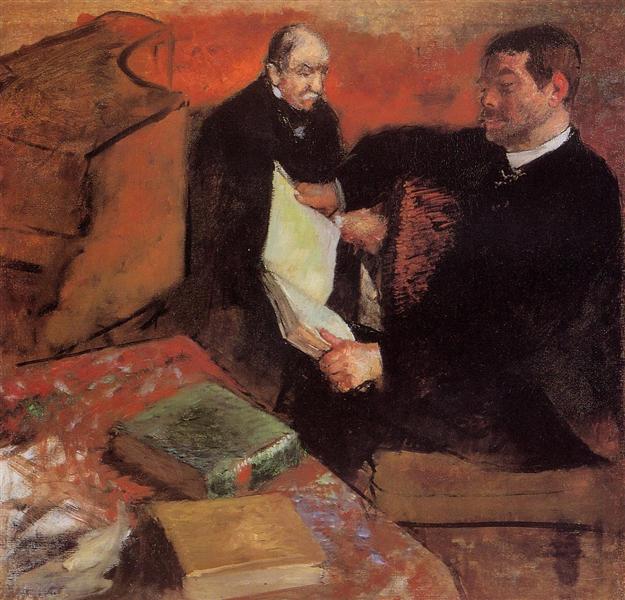Description
Edgar Degas's "Pagan and Degas's Father" created in 1895 is a fascinating intersection between intimate portraiture and the study of the human figure. Reflecting Degas's influence on the art of his time, this painting invites the viewer to delve into the personal relationship between the painter and his subject, the famous opera composer and conductor, Édouard-Louis-Antoine Pagan.
In the painting, Degas presents Pagan seated, deep in introspection that suggests a deeper connection between the subject and the artist. The composition organizes the space so that the viewer not only observes the composer, but in some way shares his emotional state. Pagan's relaxed posture, exuding dignity and serenity, allows the viewer to perceive the subject's humanity, emphasizing Degas's ability to capture moments of intimacy.
The use of color in this work is remarkable. Degas employs a controlled palette, where warm skin tones and the dark background surrounding Pagan's figure predominate, creating a contrast that focuses attention on the musical leader. The earthy hues, combined with the soft light that seems to illuminate Pagan, create a calm and almost nostalgic atmosphere. This technique is characteristic of Degas, who often explored light and shadow in his works, deepening the three-dimensionality of his subjects.
The depiction of Degas' father in the portrait adds a layer of complexity. Although the focus is not so much on the figure of Degas' father, it is important to note that his presence has added an emotional charge to the work. This interweaving of families, friends and public figures is common in Degas' work, who often takes as subjects people from his inner circle and from the worlds of art and music, reflecting his social life in the Belle Époque.
Stylistically, this painting is part of the 19th century portrait tradition, although Degas transformed it by incorporating its own characteristics of Impressionism and Post-Impressionism. The firmness of its lines, the application of paint and the arrangement of colour evoke an almost painterly structure, preceding the arrival of more modern artistic movements in the 20th century.
Although "Pagan and the Father of Degas" is not one of Degas' most frequently mentioned works, its analysis reveals a more introspective side of the artist. The interaction between subject and environment suggests an atmosphere of contemplation, a silent dialogue laden with personal history that resonates with the viewer. Thus, an intimate view is offered of the lives of the characters involved in the artistic world of the time, where music and plastic arts are intertwined in a single visual melody. Degas, through his magnificent execution and his ability to breathe life into the portrait, leaves a legacy that will continue to resonate in art appreciation to this day.
KUADROS ©, a famous painting on your wall.
Hand-made oil painting reproductions, with the quality of professional artists and the distinctive seal of KUADROS ©.
Painting reproduction service with satisfaction guarantee. If you are not completely satisfied with the replica of your painting, we will refund 100% of your money.

